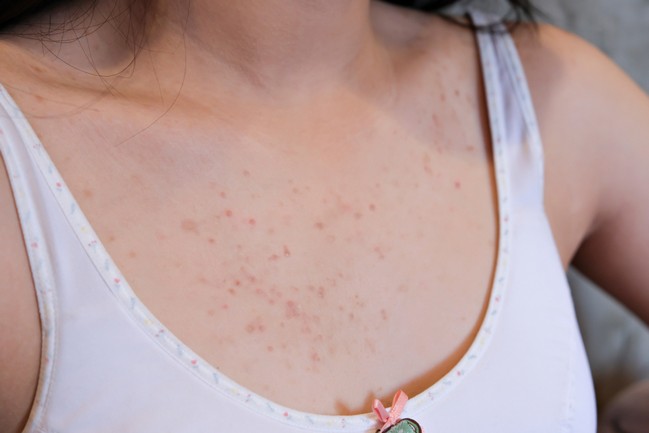Acne on the chest is a problem caused by pores becoming clogged with excess oil and dead skin cells. Acne on the chest can be caused by many factors, but it can be managed if you know the right way.
Although acne is a common problem in teenagers, acne can actually occur in people of all ages. In addition to the face, other parts of the body, such as the chest, back , or any area with sebaceous glands and frequent sweating, can also experience acne.

Causes of acne on the chest
Acne on the chest occurs when the pores become clogged with excess oil and dead skin cells. Factors that often trigger this mechanism include:
- Not bathing or cleaning the body frequently or not bathing properly enough
- Sweating a lot
- Frequent rubbing against clothing
- Using products that contain ingredients that prevent water evaporation from the skin
- Changes in hormone levels in the body that cause the sebaceous glands to produce more sebum, such as during puberty or pregnancy.
- Stress : Because stress can cause the body to produce more androgens, which are hormones that can easily trigger acne.
- Certain foods: Some people may find that they develop acne after eating certain foods, such as skim milk, chocolate , and foods high in carbohydrates.
- Side effects of certain medications, such as corticosteroids, testosterone, or lithium
10 ways to deal with chest acne
Those who have acne problems on their chest may try the following methods to relieve acne symptoms.
1. Use acne treatment products.
There are many products available today that can help with acne problems , and those who have chest acne can also choose to use acne treatment products for the face in conjunction with them. Key ingredients to look for include salicylic acid, benzoyl peroxide, and tea tree oil.
However, for safety reasons, acne product users should strictly follow the product label and, most importantly, test for allergies by applying a small amount of the product to your arm and observe for any abnormalities within 24 hours.
2. Take a shower often.
Taking a shower every morning and evening will help remove dirt, bacteria, dead skin cells and oil that can clog your pores. However, the soap you use, whether it’s in the form of a bar soap or shower cream , should be a gentle formula without harsh ingredients, and you should avoid rubbing your skin hard while taking a shower.
3. Use non-comedogenic skin care products.
For those who use skin care products , choose products that do not clog pores or non-comedogenic formulas, and choose products that do not contain fragrances or any ingredients that may cause irritation.
4. Exfoliate dead skin cells
Using an exfoliating product once a week may help remove dead skin cells from the skin, which will reduce the risk of clogged pores. However, for your own safety, always use the product as directed by your doctor, pharmacist, or on the label of the medication, and do not exfoliate too often to reduce the chance of skin irritation.
5. Use a non-irritating clothing cleaning product.
Some clothing detergents contain ingredients that can irritate the skin, so if you’re struggling with chest acne, you might want to try a detergent that’s free of ingredients that can irritate the skin, often labeled as hypoallergenic.
6. Avoid being in hot places.
Since extremely hot weather conditions can be a factor that can cause acne problems for some people, it is best to avoid being in extremely hot weather.
7. Avoid picking or squeezing pimples yourself.
Squeezing your own pimples can worsen existing acne problems, or in some cases, cause inflammation and scarring.
8. Drink water frequently.
Drinking enough water to meet your body’s needs can help your body flush out toxins better. The ideal amount is about 6-8 glasses per day, or more if you sweat a lot during the day.
9. Control stress
Stress is one of the factors that increases the risk of acne problems . Therefore, you should manage stress appropriately, such as finding the cause of stress to solve the problem from the root cause, doing activities that make you feel relaxed, such as playing sports, listening to music, talking to people around you, or consulting a doctor if you cannot cope with stress by yourself. You should also eat nutritious food and get enough rest.
10. See a doctor.
For those who have tried the above methods and the acne problem has not improved or has gotten worse, you should see a doctor so that the doctor can diagnose and http://ufabet999.app recommend the appropriate treatment.